TRA VINH Mr. Trang Tan Tai in Cau Ngang district, Tra Vinh province is a pioneer in growing Thai custard apples on sandy soil in an organic way, achieving a maximum weight of half a kilogram per fruit.
TRA VINH Mr. Trang Tan Tai in Cau Ngang district, Tra Vinh province is a pioneer in growing Thai custard apples on sandy soil in an organic way, achieving a maximum weight of half a kilogram per fruit.
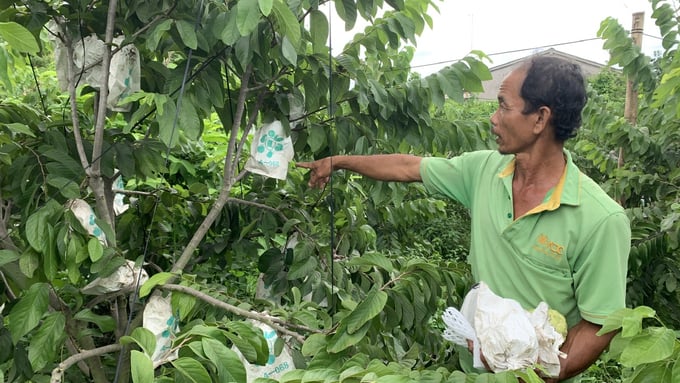
Mr. Trang Tan Tai's Thai custard apple garden is yielding 20 tons/ha. Photo: Ho Thao.
The sandy land in Cau Ngang district, Tra Vinh province is characterized by poor nutrition due to poor water retention and scarcity of irrigation water in the dry season. Therefore, farmers here only grow short-term crops.
About two years ago, Mr. Trang Tan Tai in Phieu Hamlet, Hiep Hoa Commune was the first person to bring the Thai custard apple variety to plant on an area of 0.14ha with 180 initial seedlings. Thanks to diligent care and methodical cultivation techniques, his custard apple garden produces two crops per year, achieving an average yield of 20 tons/ha and is becoming a destination for local farmers to learn from experience.
Mr. Tai shared that he used to grow many types of vegetables such as squash, pumpkin, bitter melon and cucumber but the economic efficiency was not high. Then he started to learn about fruit trees through social networks and was convinced by the Thai custard apple variety so he decided to try growing it.
“I saw that in Dong Thap, the trees only took 1.5 - 2 years to bear fruit. Each custard apple weighed half a kilo, so I went there to learn the techniques and buy seeds to plant. The price was also reasonable, 50,000 VND per seedling, 2 hand spans tall from the root ball up,” said Mr. Tai.
However, his start was not smooth. In the first rainy season, nearly half of the plants in the garden were flooded, while the remaining plants grew stunted.
According to Mr. Tai, although Thai custard apple is not picky about soil, to be successful, the grower must be passionate and have a good grasp of the technique. Not discouraged, he learned more about the characteristics of this plant and realized that it is a plant that does not tolerate water well.
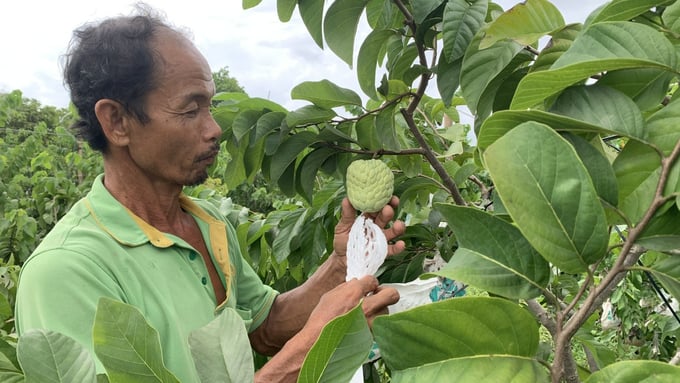
Mr. Tai carefully covers the fruit so it is not attacked by harmful organisms. Photo: Ho Thao .
He improved the garden by building a mound about 30cm higher than the garden surface and replanting trees 3m apart, while creating drainage ditches to prevent waterlogging. During the dry season, he leaves grass to keep the tree roots moist and clears the garden during the rainy months.
Mr. Tai shared that compared to other vegetables, taking care of Thai custard apples is much less labor-intensive. He only needs to install a drip irrigation system, open the watering valve twice a day, and provide enough water for the tree to grow. A 16-month-old custard apple tree can bear fruit according to the gardener's wishes.
"To make the tree bloom, I start by tightening the water and pruning the branches and leaves to help the tree concentrate nutrients on the main stem, then fertilize and water to stimulate the tree. When the tree blooms, I break the male pistil over the female flower to help the tree pollinate faster. Thai custard apple has the advantage of a nearly 100% fruit set rate, reaching a weight of 0.5kg per fruit. Growers need to prop up the branches to avoid falling over," said Mr. Tai.
Mr. Tai revealed that the average cost of materials for growing Thai custard apples is about 1.5 million VND per hectare of land per year (1 hectare = 1,000m2). Thanks to the fruit bagging method, he saves 70% of the cost of chemicals. At the same time, he mainly uses cow manure as fertilizer so the trees are always green and full of fruit.
"Currently, some households add salt to their cows' diets to help them grow faster, but if they fertilize the plants from this source, it will be counterproductive. Therefore, I only use manure from the neighborhood to fertilize the custard apple garden. The manure is applied in reasonable doses, each year I apply about 5 - 7kg/tree or adjust depending on the age of the tree and the greenness of the leaves. Although manure has a slow effect, it helps the trees stay green longer and saves about 70% of the cost compared to using chemical fertilizers," Mr. Tai noted.
This year, Mr. Tai's custard apple garden has an estimated yield of about 2 tons per hectare, with an average selling price of 30,000 - 50,000 VND/kg, bringing in income many times higher than growing other crops before.
According to Mr. Tai, Thai custard apples are very suitable for growing on sandy soil, producing fruit with a sweet taste, thin skin and little water. However, this crop is still quite new in the locality, so he is connecting with the Provincial Cooperative Union to find a stable output.
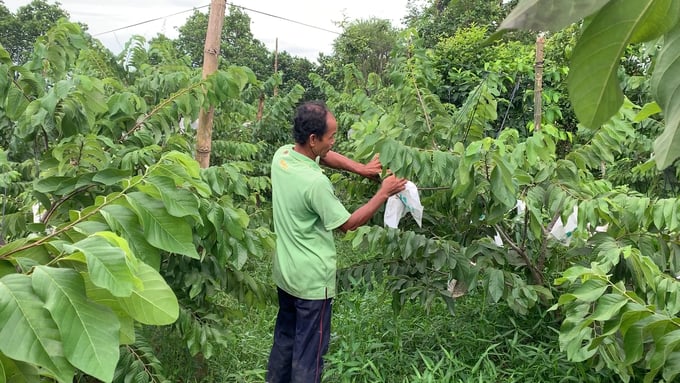
Mr. Tai's Thai custard apple garden is grown organically, and custard apples are sold for 30,000 - 50,000 VND/kg. Photo: Ho Thao.
“Every time I hear about a new variety of tree, my wife and I often travel to the provinces of the Mekong Delta to learn and bring them back to try planting. Currently, in addition to the Thai custard apple garden, my family also grows many other trees on an area of 1 hectare such as apples, purple plums, green plums, syrup and seedless jackfruit... I will continue to experiment with planting new varieties, especially organically, and if I find them effective, I will expand them and am willing to share the techniques with others,” said Mr. Tai.
According to Mr. Trang Tung, Deputy Head of the Department of Cultivation and Plant Protection of Tra Vinh province, the Thai custard apple variety, also known as the Queen custard apple, is not new in the Mekong Delta provinces. However, in Phieu hamlet, Hiep Hoa commune, Mr. Tai is the first person to bring this variety to grow organically.
"In Tra Vinh, there is still no stable outlet for Thai custard apples, mainly serving customers to sell to people for fun. In the future, if output increases, we will connect to find a market for the product, and at the same time replace other ineffective crops," said Mr. Tung.
Source: https://nongsanviet.nongnghiep.vn/nguoi-tien-phong-trong-na-thai-tren-dat-giong-cat-d405372.html


![[Photo] General Secretary To Lam holds a brief meeting with Russian President Vladimir Putin](https://vphoto.vietnam.vn/thumb/1200x675/vietnam/resource/IMAGE/2025/5/10/bfaa3ffbc920467893367c80b68984c6)
![[Photo] Prime Minister Pham Minh Chinh chairs Government Standing Committee meeting on Gia Binh airport project](https://vphoto.vietnam.vn/thumb/1200x675/vietnam/resource/IMAGE/2025/5/10/6d3bef55258d417b9bca53fbefd4aeee)




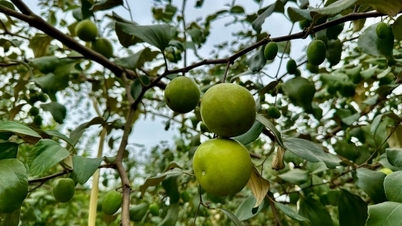
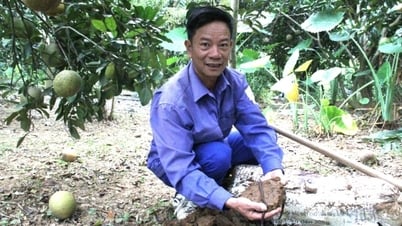
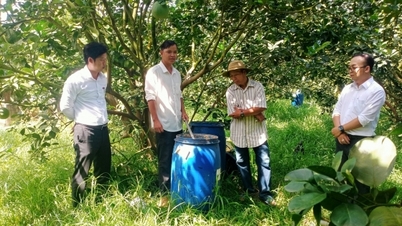
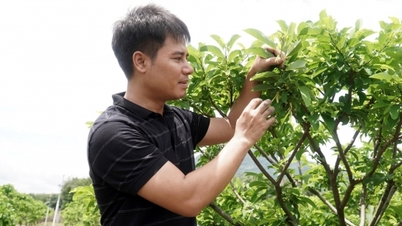
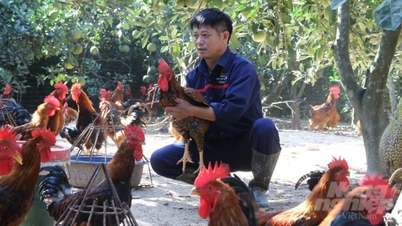
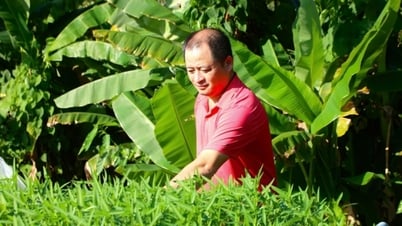



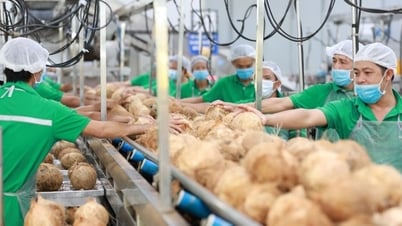










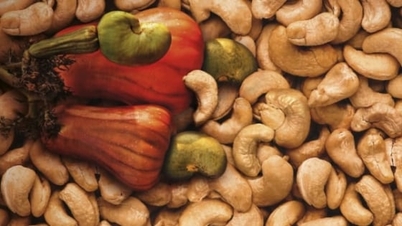
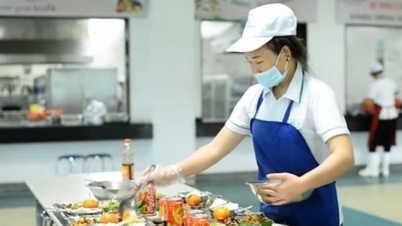
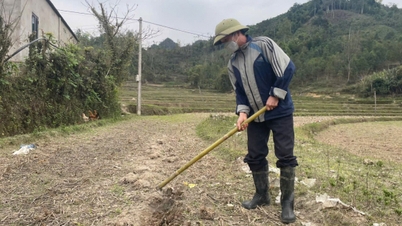
![[Photo] Prime Minister Pham Minh Chinh chairs a meeting of the Steering Committee for key projects in the transport sector.](https://vphoto.vietnam.vn/thumb/1200x675/vietnam/resource/IMAGE/2025/5/10/0f4a774f29ce4699b015316413a1d09e)




































































Comment (0)